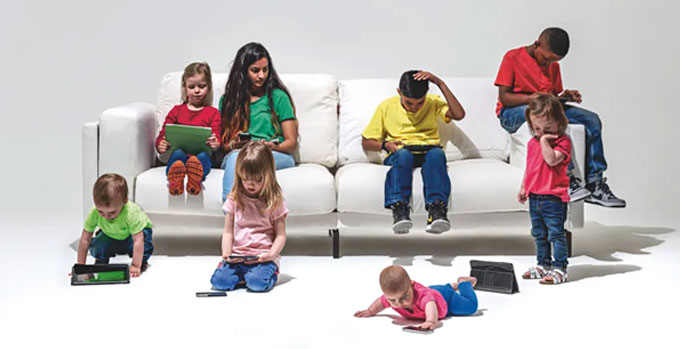Courtesy: www.theguardian.com
A Hitech world is a playground of
digital natives, digital immigrants, digital heirs, digital orphans, and many
more such captivating nomenclatures to distinguish the tech demographics.
It drives everything from
pilotless aircrafts, driverless cars to IoT’s making your heartbeat for a long
time.
Hitech has god like powers (if
there is a god) or satanic powers (if there is a satan) propelled by a
responsive marketplace that can be unfolded anywhere and anytime through the
leaps in artificial intelligence (AI), machine learning (ML), quantum computing
(QC), internet of things (IoT), blockchain technology (BCT) and so much yet to
know.
What does it mean to the future generations, say a five-year-old kid?
Can the seemingly unreal screen
time with all curated contents in YouTube kids, Netflix kids ranging from kids
shows such as Peppa Pig, Frozen, Sesame Street to Kids vloggers repeated
streaming of toy unboxing commercials be manifested as a brave new utopian
world of superhumans with an augmented degree of complex problem-solving
skills? Or the exuberance of chasing an addiction in a surreal world lead them
to a paradoxically mutilated sense of self submerged in depression and social
isolation?
Kids and their gadgets (phone,
tab, play station, and the like) are as inseparable as magnet and iron today. My
candid conversations with few five-year-olds uncovered that they are already
playing Fortnite and Minecraft in PlayStations.
Amid a gaming endorphin high,
kids hurriedly signal their parents to keep the gadgets charging or pay for
Minecraft coins or V bucks. At that moment, the only language they recognize is
the scoreboard going up to beat the dragon and little do they care for the real
money that get traded for virtual currencies.
Are we feeding our kids with the marketing feeds created by the tech monopolies?
Some of us feel that toddlers are
too young to play with the tablets while others feel that it is the right thing
to do. Children who are a captive audience provide a lucrative market for tech
consumption where the kids watch more than 6 hours on screen videos a day as
reported by BBC News against the formal advice from the American Academy of
Paediatrics (AAP) and the World Health Organization (WHO) that is utmost 1 hour
a day of screen time.
The world has not yet survived
from the shock generated by the suicide game ‘Blue whale’ where the game asks the
kids to commit suicide as the final act of the social media challenge.
The call to restrict technology
use for kids gets urgent with every research finding on gaming addiction,
online bullying, championed by child advocates and developmental psychologists;
however, parents do not perceive much threat. They express this farrago as when
digital is the way forward, what a concerned parent can do?
Do kids create technology way more than they consume?
Imagination fairies of children
go beyond the earth, the sky, and the worlds beyond. However, their little
crayons cannot capture the awe of their wonderland fairy tales. Now the virtual
world of the play stations gives them wings to fly to terrains where they think
they belong.
Today’s five-year-old kids, the
academia call them Generation Alpha, is a definite future leader of the pack
being born as a digital native.
The success stories of the
digital landscape are too tempting to be ignored as kids create technology with
insightful apps like anti-bullying, fast-track corridor for ambulance drivers
etc.
Do they choose a candid face to
face conversation when they are surrounded by numerous Alexa, Siri, and Sophia
with tailormade solution to every problem?
Do they choose to leave their
play stations or workstations for few minutes of work-out?
I hope the future generations
create the stories they want to narrate by embracing the unknown script of
their future, cracking different codes and pathways at their own pace than
consume the commercials paraded by the tech monopolies.
- Dr. Aswathi Nair
Assistant Professor
Alliance School of Business










0 Comments